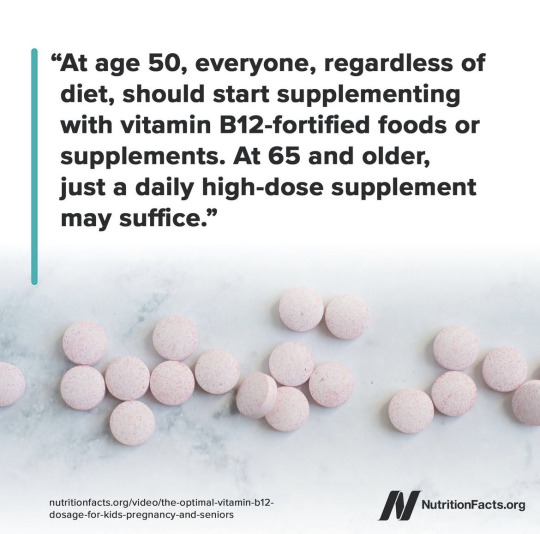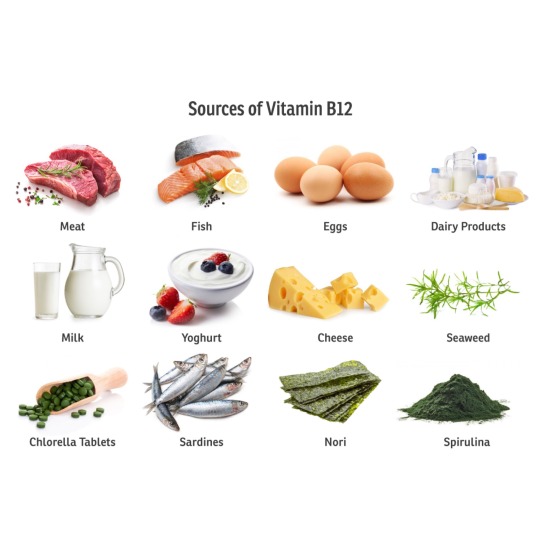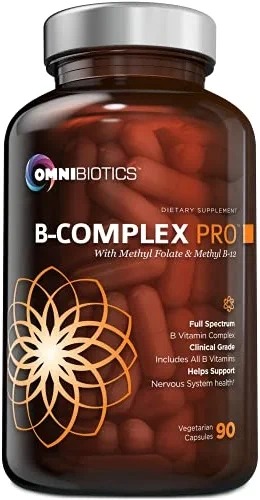#vitamin B deficiency
Text
The Importance of Vitamin B
The Importance of Vitamin B
Vitamin B is a vital nutrient for a healthy lifestyle. This is because the body is able to use it for various purposes, including the creation of red blood cells and the regulation of metabolism. In addition to this, Vitamin B plays a role in regulating the heart’s rhythm and minimizing the risk of heart disease. It is also beneficial for brain function, as well as the production of collagen.
The…

View On WordPress
6 notes
·
View notes
Text
The Importance of Vitamin B
New Post has been published on https://www.fleminggazette.com/the-importance-of-vitamin-b/
The Importance of Vitamin B


Vitamin B is a vital nutrient for a healthy lifestyle. This is because the body is able to use it for various purposes, including the creation of red blood cells and the regulation of metabolism. In addition to this, Vitamin B plays a role in regulating the heart’s rhythm and minimizing the risk of heart disease. It is also beneficial for brain function, as well as the production of collagen.
The B vitamins are a group of eight water-soluble vitamins. Each is important in the metabolic production of energy, as well as in cell signaling and neurochemical synthesis. They are synthesized in plant chloroplasts. Deficiency of any of the B vitamins can result in impaired catabolic energy production, as well as decreased DNA stability. However, the effects of a deficiency vary from person to person.
Vitamin B12 is a key cellular cofactor in methylation reactions. This cycle involves the amino acids S-adenosyl methionine (SAM) and homocysteine. Both are essential for the synthesis of other essential nutrient molecules. Deficiency of either B12 or SAM can lead to an accumulation of homocysteine, which can have negative cellular consequences.
Important Nutrients in Vitamin B

Vitamin B is a group of nutrients that includes thiamin, pyridoxine, pantothenic acid, and folate. They help your body use carbohydrates, proteins, and fats. But they also have antioxidant properties, so that your body can defend itself against free radicals.
pantothenic acid B5
Pantothenic acid, also known as vitamin B5, is an important nutrient for the human body. It plays a key role in many metabolic processes. In addition, it supports the health of the adrenal glands.
Pantothenic acid is a water-soluble vitamin that is found in a variety of foods. This B vitamin is necessary for growth, metabolism and protein synthesis.
It is commonly used in dietary supplements. When taken in large amounts, it may cause diarrhea, stomach cramps and blood clots. However, an excess of pantothenic acid is eliminated by the urine.
Pantothenic acid is primarily found in food sources, such as eggs, brewer’s yeast, meat, legumes and shellfish. Supplements are available that contain calcium pantothenate, a form of the vitamin that is mildly acidic.
Vitamin B5 is needed by the body for energy production and for the development of red blood cells and nerve cells. Pantothenic acid also helps the body convert glucose into fuel.
biotin B7
Biotin is a vital nutrient that helps the body with several metabolic functions. It is an essential co-factor for enzymes involved in protein synthesis and carbohydrate metabolism. In addition, it also has an important role in gluconeogenesis, the process of making glucose from non-carbohydrates.
Biotin is a water-soluble vitamin. It is found naturally in foods like legumes, soybeans, and tomatoes. However, it is best to get it from supplements.
As with most vitamins, there are a few things to consider before you begin taking biotin. For example, if you are pregnant or nursing, you may want to consult your doctor about your supplementation. This is especially true if you are dealing with a deficiency.
In addition, you should inform your doctor if you are taking any other supplements. If you are using antibiotics or anti-seizure medication, it may affect your vitamin B7 levels.
Pyridoxine B6
Pyridoxine is a vitamin B-6 that helps maintain a healthy nervous system. The water-soluble vitamin is present in many foods. It is also a component of many multivitamins. However, it is important to know the potential side effects of taking pyridoxine.
Vitamin B-6 can interact with several medications. For example, phenobarbital may interfere with the activity of pyridoxine. And, high intakes of pyridoxine can affect blood cholesterol levels.
There are three forms of vitamin B-6. Those forms include pyridoxal 5′-phosphate, pyridoxal, and pyridoxamine. All of them are used in the body to perform a variety of functions.
Vitamin B-6 is also important to metabolize fats. Among its other roles, it promotes the normal growth and development of the brain.
Aside from its role in the nervous system, vitamin B-6 can also aid in the creation of red blood cells. Additionally, it plays an important role in carbohydrate and protein metabolism. Consequently, adequate levels of vitamin B-6 are necessary to prevent chronic diseases.
Thiamin B1
Thiamine is an important water-soluble vitamin. It helps the body produce adenosine triphosphate (ATP), the main source of energy for cells. The brain and heart rely on this vitamin for proper function.
Vitamin B1 is a cofactor for many enzymes. This means that it aids in the breakdown of proteins, fats, carbohydrates, and amino acids.
It is an essential nutrient for all bodily tissues. When the body doesn’t have enough thiamine, it can lead to the condition known as beriberi. People with beriberi may experience muscle weakness, impaired coordination, and fluid buildup in the lower limbs.
There are other conditions that are associated with thiamine deficiency. If you are taking certain medications, you need to be careful. Also, people who have cancer, HIV, or are on dialysis are at risk.
Folate B9
Vitamin B9 (folate) is one of the most important vitamins for your health. It plays a crucial role in cell growth and energy production. Folate also helps to prevent heart and brain diseases. In addition, it may help to maintain memory function in older adults.
Folate is available as a supplement and in foods. Manufacturers often fortify food with a synthetic form of the vitamin, which is converted into folate by the body. This process is known as 5-methyltetrahydrofolate, or 5-MTHF.
Folate is present naturally in a variety of foods. Leafy vegetables and legumes are some of the best dietary sources of the vitamin. You can also find foliate in citrus fruits, beef liver, and nuts. However, because of its water-soluble nature, it can break down during cooking.
youtube
Niacin
Niacin is one of the eight water-soluble B vitamins. It is a nutrient that helps the body process carbohydrates, fats, and proteins.
Niacin is also used to treat high cholesterol. In the United States, the recommended daily intake of niacin for adults is between 14 and 16 milligrams.
The body produces niacin from tryptophan. Tryptophan is found in protein-containing foods, such as meat and milk.
Niacin is also found in foods that contain other B vitamins. For example, peanut butter contains niacin. Other important sources include poultry, seafood, and legumes. However, the level of niacin in these foods is less than that found in meat.
A deficiency in niacin has been linked to some mental health problems. These disorders may involve brain fog, fatigue, and poor circulation.
Higher doses of niacin can treat conditions such as atherosclerosis, dyslipidemia, and cardiovascular disease. There are several niacin supplements available. If you decide to take one, you must consult a health care professional to make sure it is safe for you.
Riboflavin
Riboflavin is a vitamin B complex which is needed for growth. It is a mineral that is water-soluble and can be obtained from fruits and vegetables.
The B vitamins are essential for the proper functioning of the nervous system and conversion of food to energy. They also help the body metabolize proteins, fats, and carbohydrates. Deficiency of these B vitamins can lead to a number of health problems, especially in children.
Riboflavin is an antioxidant that helps the body to fight off free radicals. These radicals can damage cells and DNA. Vitamin E is also a good anti-oxidant and is used in treating cancer, Alzheimer’s disease, and other brain and neurological diseases.
A study showed that people who took a supplement of riboflavin and niacin had less chance of developing cataracts. Cataracts are a common eye disorder caused by damage to the lens of the eye.
Riboflavin is a vitamin that is found in dairy products, eggs, and meat. It is also found in leafy vegetables.
Vitamin B12
Vitamin B12 or cobalamin is an essential nutrient that is found in eggs, meats, dairy products, and seafood. It plays an important role in the metabolism of every cell in the body.
Vitamin B12 is a critical nutrient for normal nerve function. It helps with red blood cell production and fatty acid metabolism. It is also required for myelin synthesis. This is the protective covering of nerve fibers. Deficiency of this vitamin can cause anemia and nerve damage.
In addition to being a nutrient, vitamin B12 can be used to treat anemia. As a result, this vitamin is often used in formulations that contain other vitamins.
B vitamins are water-soluble nutrients that are necessary for normal cellular functions. They are also vital for the development of red blood cells. These vitamins are metabolized by the body and excreted through the urine. People with high blood sugar may not absorb all the B vitamins in their diet.
Vitamin B12 is particularly important for people in the older age group. Deficiency of this vitamin can lead to neurological symptoms such as anemia and diarrhea. Symptoms may progress to funicular myelosis and megaloblastic anemia.
Cobalamin and folic acid are methyl donors that contribute to the synthesis of DNA. They also aid the synthesis of neurotransmitters and hormones. Their importance is increased during pregnancy. Folate is also important to the growth and development of babies. Some drugs can lower folate levels.
There is evidence that neurotropic B vitamins contribute to the regeneration of injured nerves. When combined with other neurotropic nutrients, these vitamins can help alleviate the symptoms of peripheral neuropathy.
Benefits of vitamin b
If you’re considering adding B vitamins to your diet, it’s important to understand the many benefits of these nutrients. The most common vitamin B deficiencies are caused by pernicious anaemia, a condition where the body cannot properly absorb Vitamin B12.
Other than providing the body with energy, B vitamins also have some healing properties. They help keep your gut healthy and your immune system functioning. For example, they help repair DNA. Moreover, they have been shown to improve stress levels.
One of the most notable B vitamin benefits is its ability to help you produce norepinephrine, a neurotransmitter that helps your brain manage stress. Additionally, this vitamin aids the formation of red blood cells. Its antioxidant properties can help fight free radicals, which can lead to heart disease.
Sources of vitamin b
One of the best ways to improve your health is to get sufficient amounts of B vitamins. These are vital nutrients for your body. They help you maintain a healthy diet and provide you with the energy you need. If you aren’t getting enough, you may need to take a supplement.
Foods that contain high levels of B vitamins include red meat, milk and eggs. You can also find some vitamin B in fruits and vegetables. But, you will need to eat a variety of these foods to ensure you get the right amount.
The most important vitamins in the B complex are folic acid, niacin, pantothenic acid, and biotin. Folic acid, for example, is needed for every cell in your body. It also helps your body form DNA. Deficiency of this vitamin can lead to serious birth defects, including spina bifida.
What foods have vitamin b?
If you are looking for a way to get more Vitamin B in your diet, you might want to try a few of the many dietary supplements on the market. However, a much better way to boost your Vitamin B intake is to just eat more of the foods that contain them.
The most important nutrient is probably Vitamin B12, but many other vitamins and nutrients are found in a variety of foods. So it is important to eat a wide variety of foods to keep your body healthy.
Fortunately, it is not difficult to get the recommended dose of Vitamin B12 through food. Many foods are naturally rich in the vitamin, and some are fortified to increase their potency. For example, most bread is fortified with thiamin, which is a good source of Vitamin B.
Is it okay to take vitamin B everyday?
Most people get all of the B vitamins they need through their diet. If they don’t, a high quality supplement can ensure that they’re getting enough.
There are several B vitamins, including riboflavin, thiamin, niacin, and pantothenic acid. They have different functions and benefits. It’s usually a good idea to get a diverse selection of foods, so that you’re getting the proper amount of each.
The benefits of taking vitamin B are numerous. Some studies suggest that they may help to improve your immune system and reduce the risk of cancer. In addition, they can boost heart health and promote healthy nerves.
Taking more than the recommended daily dosage isn’t advised. That said, if you’re not sure whether you’re getting enough, talk to your doctor. He or she can tell you the best ways to increase your intake.
Vitamin b deficiency
Vitamin B deficiency can affect multiple organ systems. If left untreated, this condition can result in a stroke, heart attack, and neurological problems. To prevent this, make sure you’re getting enough vitamin B through food, supplements, and medication.
In addition to being important for cell growth, B vitamins are essential for producing energy. They help the body turn carbohydrates into energy, fats into energy, and proteins into energy. Deficiencies in any of the eight B vitamins can result in symptoms.
Vitamin B deficiency can occur for a variety of reasons, such as poor diet, inadequate intake of other nutrients, and disease. Some medications can also lead to vitamin B deficiency.
If you’re unsure whether you have a deficiency, it’s best to consult a doctor to perform a physical exam and blood testing. This can include checking for low transcobalamin levels and amino acids. These tests will allow your doctor to determine what caused your deficiency.
#food with vitamin b#vitamin b complex#vitamin b deficiency#vitamin b food#vitamin b foods#Health and Fitness
0 notes
Text
after an inconclusive MRI i begged my doctor for full bloodwork because i still don't know what's wrong with me. first half of the results show an insanely low white blood cell count, so now i get to feel sweaty and anxious while i wait for the rest of the results to tell me if i have some kind of vitamin deficiency causing that or something Worse 👍
#it was 3900#really hoping it ends up being a b vitamin deficiency because thats what i was really testing for in the first place#since my issues are nerve damage and migraines#but it could also be an autoimmune disorder or MAYBE my allergies as more benign-ish possibilities#but all the other possibilities are! not great!
70 notes
·
View notes
Text

Well, looks like I made it to 27!
A big thank you to my friends and family for supporting me with love and kindness, and a lot of patience. A big thank you as well to all my online buddies, though I know many of us only occasionally chat nowadays. Y'all keep me going. ♡
Let's hope I have many more birthdays to come!
#doodles#personal#it has happened! I've turned 27!#ah... 3 years from 30! nice!#what a strange process aging is#i shall continue to be a nuisance about my interests hehe#i shall also hopefully be in better health soon bc guess who's been very vitamins d and b deficient?#it would be nice to have energy to do stuff#anyway i have no big birthday plans this year but i do hope tomorrow is a peaceful day at work#i may have new items to process so that's fun#i do like to stay busy when i can#like if I'm putting aside all my spoons for work I'd better have some Tasks lol
75 notes
·
View notes
Text
gamers I’ve got like SO many nutrient deficiencies
#like when I say to people that I’m a picky eater they’re like ‘oh I’m sure it’s not that bad’#nah bro#I’ve got like SO many nutrient deficiencies#like b vitamins#iron#vitamin d#I had SCURVY at one point#I eat mainly rice pasta and occasionally chicken#THATS IT#how do I stop having ARFID#arfid#personal
3 notes
·
View notes
Text
Trying to figure out if testosterone can cause someone to grey prematurely and all of my results are either
A) cis men on steroids
B) 'here's how estrogen can effect your hair!'
#transandrophobia#trans men are so fucking under-studied#for the record simce someone gonna say bullshit i can taste it#i think I'd look cool as hell with grey hair i just wanted to know if maybe testosterone was causing it#because i ruled out vitamin deficiencies since while my diet isnt great#most listed only the vitamin b stuff which im fairly good on
23 notes
·
View notes
Text

The B in B Vitamins stands for bad-smelling 🤢
#Instagram#vitamins#preservatives#anaemia#vitaminb12#malnutrition#deficiency#nutrition#supplements#multivitamins#arfid#vitaminb#smells#ineedfairypee#fairypeememes#I Need Fairy Pee#life memes#b vitamins#bad smell#vitamin deficiency#vitamin b12#vitamin b6#vitamin b3#autism memes#recovery memes#vitamin supplements
9 notes
·
View notes
Text


Vitamin B12 is essential to nerve and cell health. It is not often found in plants or plant-based foods, with the exception of nutritional yeast, mushrooms, and sea veggies (algae). If you are vegan, vegetarian, or plant-based, you WILL need to supplement it. Common B12 deficiencies are fatigue, tingling, poor memory.
#vitaminB12 #vitaminb #health #healthtips #vitamins #healthy #vegan #vegetarian #plantbased #energy #weightloss #vitamin #wellness #healthylifestyle #deficiency #nutrition #cellhealth #nervehealth #nutritionist #healthcoach
#b12#vitamin b12#b12 deficiency#vegan#vegetarian#plantbased#Nutrition#vitamin#vitamins#b vitamins#Health#Healthy#Health tips#Nutritionist#health coach
12 notes
·
View notes
Text
The Top 10 Health Benefits of Vitamin B Complex Pro!
The Top 10 Health Benefits of Vitamin B Complex Pro!
Vitamin B Complex PRO is a supplement that contains a combination of B Vitamins, including B1, B2, B3, B5, B6, B7, B9, and B12. It can help support energy production, metabolism, and cognitive function. It also helps promote healthy skin, hair, and nails. Vitamin B Complex PRO is suitable for those who are looking to increase their intake of B vitamins or those who are deficient in one or more of…

View On WordPress
#b complex#b12 deficiency#folic acid#health and wellness#nutrition#supplements#vitamin#vitamin b#vitamin b12#vitamin b12 deficiency#vitamin b12 deficiency symptoms#vitamin b12 foods#vitamin b6#vitamin c#vitamin d#vitamins
12 notes
·
View notes
Text
DM ME BREAKBEATS
reblog for reach pls :3
#breakbeat#music producer#please i need them#i'm vitamin b deficient#b stands for breakbeat#vitamin breakbeat-12 lol
2 notes
·
View notes
Text
#trending#viral trends#for you#good morning#vegetables#vitamin#vitamin b#vitamins#vitamin deficiencies#vita#vitamin and mineral deficiencies
0 notes
Text
The sexual tension between me and arugula is insane rn
1 note
·
View note
Text
more new tablets lads !!
#apparently i am vitamin b12 deficient so in addition to upping my ritalin im going on those supplements#and my iron levels r good so im gonna b stopping taking those supplements soon ^_^ exciting times#tbh i kind of like it. novelty innit
2 notes
·
View notes
Text
OK Google why do I almost always feel like I've been hit by a car??!
#tehshelaroxx#themuseabides#is it the vitamin d deficiency#the vitamin b deficiency#is it the depression#the list of possibilities goes on
0 notes
Text
विटामिन बी12 की कमी क्या है? What is B12 Deficiency in Hindi

गुड़गांव में मिरेकल्स अपोलो क्रैडल/स्पेक्ट्रा में इंटरनल मेडिसिन डॉक्टर (internal medicine doctor in Gurgaon) डॉ. सौरभ जिंदल के अनुसार, विटामिन बी12 की कमी (B 12 vitamin deficiency), जिसे हाइपोविटामिनोसिस बी12 (hypovitaminosis B12) भी कहा जाता है, तब होती है जब शरीर को पर्याप्त मात्रा में विटामिन बी12 नहीं मिलता है या इसे सही तरीके से अवशोषित नहीं कर पाता। विटामिन बी12 एक महत्वपूर्ण पोषक तत्व है जो रक्त निर्माण, न्यूरोलॉजिकल कार्यप्रणाली, और डीएनए संश्लेषण में अहम भूमि का निभाता है। इसकी कमी के कारण प्रियरिशस एनेमिया (pernicious anemia), न्यूरोलॉजिकल विकार(neurological disorders), थकावट (tiredness), अवसाद (depression), और गैस्ट्रो-इंटेस्टाइनल समस्याएँ (gastro-intestinal problems) हो सकती हैं। आमतौर पर, विटामिन बी12 का सामान्य स्तर (vitamin b 12 normal range) 200-900 पिको ग्राम प्रति मिलीलीटर (pg/mL) होता है। 200 pg/mL से कम स्तर को कमी माना जाता है और इसे उपचार की आवश्यकता होती है। विटामिन बी12 की कमी को सही आहार, सप्लीमेंट्स, और चिकित्सीय हस्तक्षेपों से ठीक किया जा सकता है। समय रहते इसका पता लगाकर उचित उपचार करना बेहद जरूरी है ताकि दीर्घकालिक स्वास्थ्य समस्याओं से बचा जा सके।
Visit at - problems due to deficiency of vitamin b12
#problems due to deficiency of vitamin b12#deficiency of vitamin b12#vitamin b12#vitamin b#Miracles Healthcare#internal medicine doctor in Gurgaon
0 notes
Text
=3=
#sleeping with a beanie onn.......#my scalp is being annoying again.#i dont know what it is and maybe i should get it checked out but it could very well just be dandruff or whatever.#anyway it is all flaky and VERY fun to scratch at =w=bb which i dont think i should do.#so beanie it is.......#>:(#sillyposting#im horrible with picking and i KNOW as soon as these bitches develop scabs it will just get worse =w=b whoopss#i should look into this it doesnt feel normal but were chill about it.#its probably just dandruff or some vitamin deficiency or whatevss
0 notes